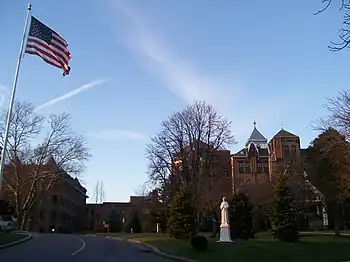Seton Hill University
Seton Hill University is a private Catholic university in Greensburg, Pennsylvania. Originally a women's college, it became a coeducational university in 2002 and enrolls about 2,200 students.[1]
 | |
Former names | Seton Hill Schools (1885–1914) Seton Hill Junior College (1914–1918) Seton Hill College (1918–2002) |
|---|---|
| Motto | Hazard Yet Forward |
| Type | Private university |
| Established | 1885 |
Religious affiliation | Catholic Church (Sisters of Charity) |
| President | Mary C. Finger |
| Undergraduates | 1,676 |
| Location | , U.S. |
| Campus | Suburban |
| Colors | Crimson and gold |
| Nickname | Griffins |
Sporting affiliations | NCAA Division II – PSAC (West) |
| Mascot | Griffin |
| Website | www |
 | |
History
The school was founded in 1885 by the Sisters of Charity.[2] It is named for Elizabeth Ann Seton (1774–1821), who founded the Sisters of Charity and who, after her death, was canonized as the United States' first native-born saint.[3] (Seton Hall University and Saint Elizabeth University in New Jersey are also named after Elizabeth Ann Seton.)
In 1914, Seton Hill Junior college was opened by the Sisters of Charity. With the approval of the Commonwealth of Pennsylvania, Seton Hill College was created four years later.[2]
In 1946, 40 male World War II veterans were accepted as students at Seton Hill.[4] During the 1980s, men were regularly admitted to many programs at Seton Hill College, including music and theater. In 2002, Seton Hill was officially granted university status by the Pennsylvania Department of Education.[5]
Seton Hill University received widespread public attention[6][7][8] after announcing a technology plan that includes providing an iPad to all full-time students, as well a 13" MacBook to all incoming freshmen. Upon graduation, students keep both devices.[9] Beginning in the fall of 2013, new full-time students will receive an iPad Mini and new full-time freshmen will be provided with a MacBook Air.[10] Seton Hill University is recognized as an Apple Distinguished School.
Academics
Seton Hill divides its undergraduate programs into six schools: Business, Education & Applied Social Sciences, Humanities, Natural & Health Sciences, and Visual & Performing Arts. In addition to their major, all students take liberal arts core classes in arts, mathematics, sciences, culture, history, and writing. The university also offers twelve graduate programs. Subjects include art, writing, education, therapy, business, orthodontics, and physician assistant studies.
The typical class size for courses in the major is about 20–25. Liberal arts core classes tend to be larger, at 30-45 students.
Centers

- National Catholic Center for Holocaust Education
- Child Development Center
- Center for Family Therapy
- SHU Center for Orthodontics
- The Wukich Center for Entrepreneurial Opportunities
- Performing Arts Center
- Dance and Visual Arts Center
- Robert M. Brownlee Mathematics Enrichment Center
LECOM at Seton Hill
LECOM, one of the largest medical schools in the United States, entered a partnership with SHU and extended its LECOM Erie campus to the university in 2009.[11] LECOM at Seton Hill added an additional 104 medical students to the first-year class, and, now, it has graduated more than 1,000 physicians since the first graduating class of 2013.
SHU is also one of LECOM’s EAP (Early Acceptance Program) affiliates, allowing qualified high school seniors to apply for its combined BS/DO program and get accepted to LECOM before entering SHU or while studying in the underclassmen years at SHU.[12]
Athletics

Seton Hill athletics teams are the Griffins. The university is a member of the Division II level of the National Collegiate Athletic Association (NCAA), primarily competing in the Pennsylvania State Athletic Conference (PSAC) since the 2013–14 academic year.[13] The Griffins previously competed as a member of the West Virginia Intercollegiate Athletic Conference (WVIAC) from 2006–07 to 2012–13; and in the American Mideast Conference of the National Association of Intercollegiate Athletics (NAIA) from 1999–2000 to 2006–07. During the 2006–07 school year, Seton Hill had dual membership with both the NAIA and the NCAA as part of the transition.
Seton Hill competes in 19 intercollegiate varsity sports: Men's sports include baseball, basketball, cross country, football, lacrosse, soccer, track & field and wrestling; while women's sports include basketball, cross country, equestrian, field hockey, golf, lacrosse, soccer, softball, tennis, track & field and volleyball.
History
After president JoAnne Boyle formalized the school's new status as a university, the teams' nickname was changed from "Spirits" to "Griffins," and several men's athletics teams were added, including football. In 2006, Seton Hill announced it was transferring to NCAA Division II and joining the WVIAC as a provisional member (with full WVIAC competition in 2007–08). Prior to that, they had belonged to the NAIA and in the American Mideast.
As of July 1, 2013, following the breakup of the WVIAC, along with the University of Pittsburgh at Johnstown, also from the WVIAC, Seton Hill joined the PSAC.[14]
In 2005, 60% of the entering class was male, due to an influx of male students who were interested in new sports programs such as football. In 2008, the football team had a 10–3 record. The football team and the men's soccer team each won the inaugural West Virginia Intercollegiate Athletic Conference's team sportsmanship award in 2008.[15]
In 2006, the baseball team received a berth to the NAIA World Series in the program's third year of existence.
In 2014, the baseball team had its most successful season; winning the PSAC, the Atlantic Regional, and advancing to the College World Series. The team ended up finishing top six in the country.
Notable alumni
- Eileen DeSandre, actor
- Ronne Froman, Rear Admiral and Commander of Navy Region Southwest
- Patricia A. Gabow '65, CEO of Denver Health
- Ethel LeFrak, wife of billionaire Samuel J. LeFrak and New York City philanthropist.[16]
- Justice Maureen O'Connor, '73 and sixth woman to serve as an Ohio Supreme Court justice.
- Kameron Taylor, professional basketball player
- Stephanie M. Wytovich editor, novelist and poet
References
- "About Seton Hill University". Seton Hill University. Retrieved 12 August 2012.
- "Seton Hill University - A Leading Catholic Liberal Arts University in Greensburg Pennsylvania". Setonhill.edu. Archived from the original on 2012-06-24. Retrieved 2012-08-12.
- Knight, Kevin. "St. Elizabeth Ann Seton". Catholic Encyclopedia. New Advent. Retrieved 12 August 2012.
- "Seton Hill University, Then & Now". Seton Hill University. Retrieved 15 April 2013.
- "PittsburghLIVE.com - Seton Hill to be university". Archived from the original on April 26, 2002. Retrieved June 1, 2012.
- Sande, Steve (March 30, 2010). "And so it begins... Seton Hill University to give all students an iPad". TUAW (or The Unofficial Apple Weblog). Retrieved 12 August 2012.
- "Seton Hill University hands out iPads to students". Engadget.com. 2010-03-30. Retrieved 2016-04-01.
- Carr, David (March 31, 2010). "And an iPad in Every Backpack". The New York Times. Retrieved 12 August 2012.
- "iPad for Everyone!". The Griffin Technology Advantage. Seton Hill University. Archived from the original on 12 May 2012. Retrieved 12 August 2012.
- "Mobile Learning @ the Hill · Seton Hill University". Setonhill.edu. Retrieved 2016-03-26.
- "LECOM History". Lake Erie College of Osteopathic Medicine. Retrieved 2023-09-09.
- "Osteopathic Medicine (LECOM) (B.S./D.O.)". Seton Hill University. Retrieved 2023-09-09.
- "Pennsylvania State Athletic Conference Expands". Seton Hill University. Retrieved 15 April 2013.
- "Media Relations · Seton Hill University". Setonhill.edu. Retrieved 2016-03-26.
- "West Virginia Intercollegiate Athletic Conference". Archived from the original on January 12, 2009. Retrieved February 18, 2009.
- "New York Philanthropist Ethel LeFrak to Receive Seton Hill University Honor". Seton Hill University. Retrieved 2018-12-04.